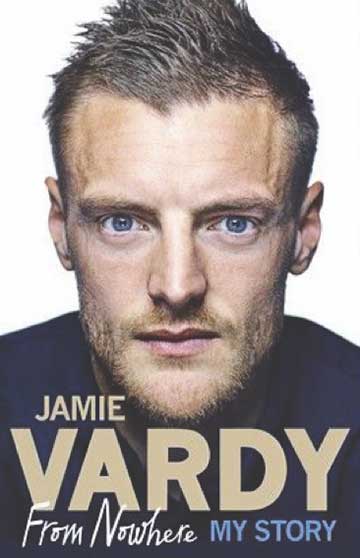
with Stuart James
Ebury Press, £7.99
Reviewed by Saul Pope
From WSC 365, July 2017
Buy the book
This autobiography, now out in paperback, starts with an account of the party Jamie Vardy hosted during Chelsea’s game against Tottenham game at the end of the 2015-16 season. The 2-2 draw meant that Leicester City won the Premier League, and the narrative describes the atmosphere at Vardy’s house. It is no surprise to hear that the players were “going completely wild” as the room “just erupted” at the final whistle. Unfortunately, this low level of insight is fairly typical of the subsequent 300 or so pages.
As a straightforward account of Vardy’s career so far, it works quite well. Early on we get a picture of a youngster more interested in football than school (with the exception of maths). Once he starts playing part-time after being rejected by Sheffield Wednesday, we see a young man who likes going out drinking with his friends as much as playing football.
At this point he’s working shifts in a factory making carbon-fibre splints for disabled people, and gets arrested and placed onto an electronic tag after an incident outside a nightclub. The job is described as tiring but rewarding, and the fight came about after Vardy’s friend was mocked for having a hearing aid.
More of this kind of detail would have made for a better autobiography and an understanding of the person behind the professional footballer. Instead we get a lot of description of drinking escapades in the early stages of the book, and of his goals once he’s adjusted to playing for Leicester. The first of these is not too interesting for anyone who’s been out drinking before, and the second isn’t that exciting to anyone with YouTube.
The narrative might have been livened up with some insight into other professional footballers, but there is little other than an account of how Esteban Cambiasso and Vardy clashed and a brief description of why he chose David Nugent to be his best man. The realisation dawns that it might have been better to read Robert Huth’s autobiography instead, who from the account here seems to have a decent sense of humour.
The tenth chapter, in which Vardy talks about being accused of racism following an incident at a casino and the media pressure on his family, is the best. The reader gets more insight into a modest and grateful man who sometimes puts his foot in it; there is a sense of decency in his wish to apologise in person for the casino incident, and of poignancy as the reader hears of the cracks that have appeared in his family relationships.
Written with Guardian football journalist Stuart James, the story does not drag at any point and is well structured but there is little to truly engross the reader. And the regular references to how unbelievable Vardy’s rise is – as if anyone reading would doubt this – do become tiresome.